Blast Rocks Iran’s Oldest Oil Refinery Near Persian Gulf
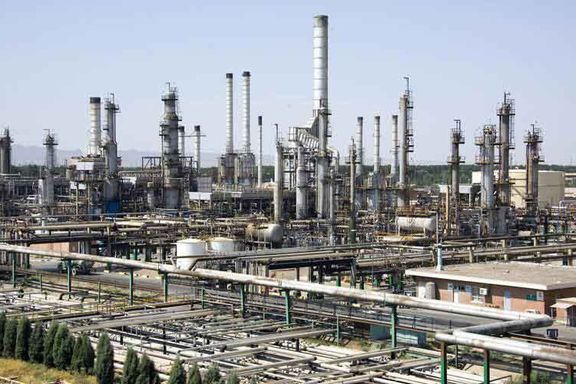
An explosion rocked Iran’s and Middle East’s oldest oil refinery in southwestern city of Abadan in the oil-rich Khuzestan province overnight, state media reported on Friday.

An explosion rocked Iran’s and Middle East’s oldest oil refinery in southwestern city of Abadan in the oil-rich Khuzestan province overnight, state media reported on Friday.
According to the government’s official news website, IRNA, the blast was caused by the bursting of one of the furnaces of the sulphur production unit of phase three of Abadan Oil Refinery during the start-up operation, causing a huge explosion.
The blast apparently had no casualties, and IRNA claims that production at the refinery continues as usual.
This is the second incident at the Abadan refinery, which supplies around 25 percent of the country’s fuel needs, this year. In April, a section of the refinery caught fire but the blaze was contained with no fatalities or injuries.
Abadan, near the Persian Gulf coast, is Iran’s largest refinery with a daily capacity of 430,000 barrels of crude, producing liquefied petroleum gas, gasoline, kerosene, gas oil, jet fuel, furnace oil, bitumen, petroleum solvents, sulfur, and naphtha. Abadan refinery, opened in 1912 by the Anglo-Persian Oil Company originally as a pipeline terminus, quickly became one of the world's largest refineries and was an important supplier to the British military.
Several explosions and fires in Iranian military and industrial sites − including pipelines and refineries − since mid-2020 have not been fully explained by authorities. However, they have blamed Israel for a series of spectacular sabotage attacks on nuclear facilities, including two explosions at Natanz uranium enrichment center. Israel has not taken responsibility for any incident.
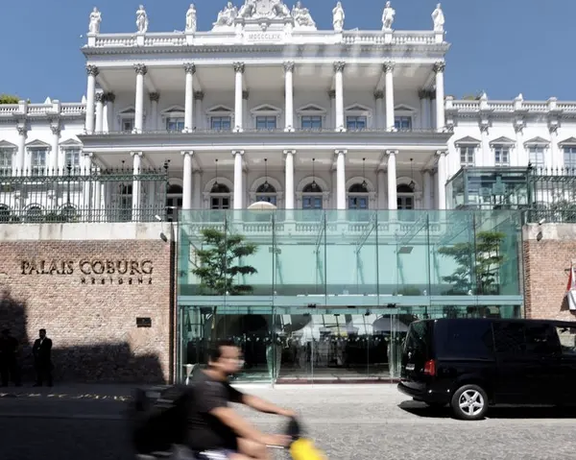
The United States took a “hasty” step by calling Iran’s latest response in the nuclear talks “not constructive”, the official government news website IRNA said on Friday.
In a long unsigned article, IRNA insisted that Iran’s positions in the nuclear talks have not changed and quoted remarks by President Ebrahim Raisi made earlier in the week. It said the president had insisted on four conditions: Removing United States’ sanctions, verification, reassuring guarantees and shelving IAEA demands on safeguards.
Recent optimistic assessments tended to assume that agreement was reached on most of these issues, except the demand of the International Atomic Energy Agency to receive satisfying answers from Tehran on its past undeclared nuclear activities.
IRNA said that based on the four conditions Iran sent its response on Thursday to the EU coordinator of the talks, Enrique Mora and hours later the United States in a “hasty” move called Iran’s response “not constructive”. It claimed that earlier Western sides had agreed that Iran’s demands on lifting sanctions and closing the IAEA file were reasonable.
IRNA specifically cited comments by European Union foreign policy chief Josep Borrell on August 22 that had called Iran’s earlier response of August 15 “reasonable”.
The article concluded by saying that the delay in an agreement is solely due to “America’s internal problems” and “weakness in the Biden Administration's decision making.”
President Joe Biden faces domestic opposition to reviving the JCPOA, but Iran has also insisted on concessions that in some cases go beyond the JCPOA framework.

An advisor to Iran’s negotiating team has criticized Washington’s reaction to Tehran’s latest position on reviving the 2015 nuclear deal, saying for the US "constructive" means accepting its terms.
Mohammad Marandi, who acts as de facto spokesman for the Islamic Republic’s nuclear negotiating team, said in a tweet on Friday that “It's time for the Biden team to make a serious decision.”
Noting that If the United States makes “the right decision, an agreement can be swiftly concluded,” he said that “For the US 'constructive' usually means accepting US terms; for Iran it means a deal that is balanced and protected.”
Iran’s Foreign Ministry spokesperson Nasser Kanaani said early on Friday that Tehran has sent a "constructive" response to US proposals, but the US State Department gave a different assessment.
"We can confirm that we have received Iran's response through the EU," a White House National Security Council spokesperson Adrienne Watson said. "We are studying it and will respond through the EU, but unfortunately it is not constructive,” adding that "Some gaps have closed in recent weeks, but others remain."
Also on Friday, Tasnim news, affiliated with the Revolutionary Guard, quoted Ebrahim Azizi, the deputy chairman of the Iranian Parliament's National Security and Foreign Policy Committee, as saying that the US should decide whether it wants to finalize the agreement or not. “Iran's most important demand is economic benefit,” he said, reiterating that “the safeguard issues must be also resolved and all allegations about Iran's nuclear issue must be dropped.”
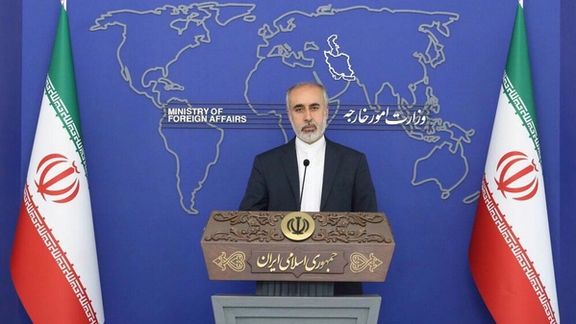
Iran’s foreign ministry says it has finalized its comments on the US response to the EU’s draft for reviving the 2015 nuclear deal and sent it to EU coordinator of talks Enrique Mora.
Foreign ministry spokesman Kanaani said in the early hours on Friday that the Islamic Republic’s response was prepared based on a "constructive approach."
“After receiving the American response, the expert team of the Islamic Republic carefully examined it and after evaluation at different levels, Iran's response was compiled and delivered to the coordinator tonight,” Kanaani said. "The text that was sent has a constructive approach aimed at finalizing the negotiations."
American journalist Laura Rozen quoted the unnamed EU official as saying that the bloc has received Iran’s response “just now”.
Earlier in the day, French President Emmanuel Macron expressed hope for a renewed Iran nuclear deal as President Ebrahim Raisi proclaimed defeat for US ‘maximum pressure.’
“I hope that in the next few days the JCPOA will be concluded,” Macron told French ambassadors in a Paris speech, referring to the Joint Comprehensive Plan of Action as the 2015 Iran nuclear agreement is officially named.
In Washington, criticism of JCPOA revival has been stepped up both by Congresspeople and the advocacy group, American Israel Public Affairs Committee (AIPAC).
Fifty lawmakers, mostly Democrats sent a letter to Biden on Thursday asking him to “provide Congress with the full text of any proposal to rejoin the Iran nuclear agreement…including any side agreements, and consult with Congress prior to reentering that agreement.”
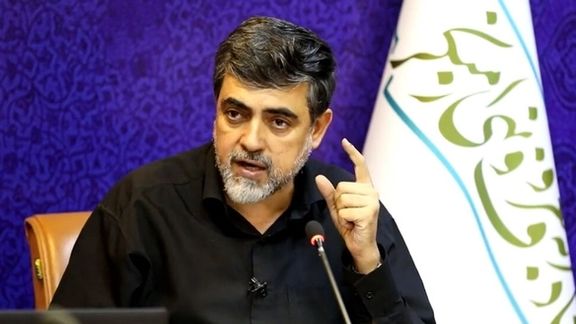
A top official in charge of Islamic morals in Iran has defended gender segregation in higher education, claiming that families will welcome its introduction.
In a video interview earlier this week, Mohammad-Saleh Hashemi-Golpaygani, in charge of a government organization called Enjoining Good and Forbidding Evil Headquarters, claimed that gender segregation in higher education institutions will contribute to the progress of science and knowledge.
“I don't have an answer when I'm asked why students are kept separate before they reach adulthood but are mixed when they go to university,” he said.
Boys and girls are strictly separated from primary school, but most universities are mixed gender.
“Families will welcome gender segregation [in higher education]. They want a safe environment [for their children],” he said wildly claiming that there are twenty-one universities and colleges in the world that segregate including some in the United States. He also claimed that the average grade point rose by 1.5 in these universities after separating men and women.
Hashemi-Golpaygani’s remarks have outraged many on social media and websites and newspapers have criticized him for his controversial remarks.
In an editorial Tuesday, the moderate conservative Asriran told Hashem-Golpaygani that with his “imprudent and incorrect statements” -- including the undocumented claim that many of the world's top universities have implemented gender segregation and achieved better academic results as well as existence of facial recognition software that can help identify women with insufficient hijab -- he obliterates the Islamic concept of ‘enjoining good and forbidding evil’ and provides sensational stories for foreign-based Persian language media.
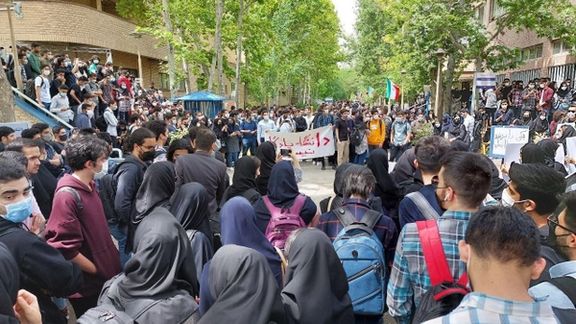
Some social media users have pointed out that Hashemi-Golpaygani’s own daughter has been studying in a mixed-gender university in Belgium.
In the same interview, Hashem-Golpaygani said that public CCTV cameras, including those in metro stations, are programmed to use facial recognition technology to take photos of unveiled women and to compare against photos in a national database to identify those who break the hijab rules. He suggested that the rule breakers be fined in the same way that people are fined for violating traffic regulations.
Hashem-Golpaygani said recently that about half of Iranian women do not abide by the mandatory hijab rules.
In its editorial entitled “Watch Fewer Sci-Fi Movies”, Asriran also told the offical that he should present himself to Iran’s state-run Cinema Organization if he is interested in the science fiction genre. His suggestion that fining hijab-rule-breakers by using blurry CCTV images will help convert them to hijab “would only be possible in sci-fi or comic films,” Asriran wrote.
The website also suggested that such technology, if it were available in the country, would better be used to find dangerous criminals. The police have numerous burglaries, car thefts, and mugging cases on their hands with footage of the culprits who they cannot identify.
In recent months government and security agencies have intensified their efforts to pressure women into abiding by the hijab laws and several rounds of anti-hijab civil disobedience campaigns have followed.
The patrols by the ‘morality police’ have increased on the streets and videos of violent arrests of women and girls as well as confrontations between people and hijab enforcers, including a recent incident in Shiraz which resulted in the closure of the shopping center where it happened, are becoming too common on social media.
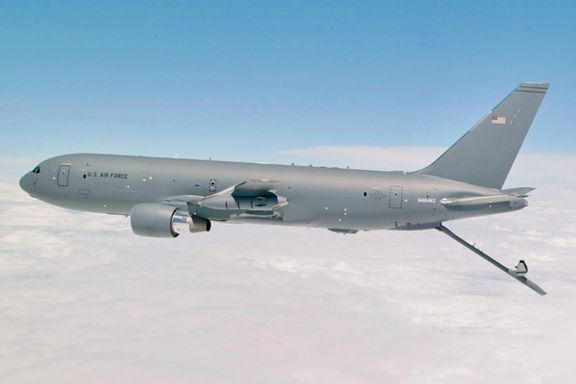
The United States will sell four Boeing KC-46 refueling planes to Israel till 2025, which can facilitate strikes against targets in Iran, some 2,000 kilometers (1,200 miles) from Israel.
Aircraft manufacturer Boeing signed a contract with the US Department of Defense to supply Israel with the Boeing KC-46 Pegasus planes needed for strikes far outside the regular flight range of Israeli jets, the company said in a statement on Wednesday.
They are scheduled to arrive in 2025 at the earliest, so that the Israeli air force can replace its aging fleet of 707 refueling tankers.
Israel has asked that this date be moved up — which would require the US to give up its spot in line to receive the planes from Boeing — but Washington has not accepted the request yet. The potential sale of eight KC-46s to Israel for some $2.4 billion was approved by the State Department back in March 2020.
The announcement came the same day that President Joe Biden had a 45-minute-long phone call with Israeli Prime Minister Yair Lapid, in which the two discussed “global and regional security challenges, including threats posed by Iran.” "The President underscored US commitment to never allow Iran to acquire a nuclear weapon," the White House said in a statement.
“This contract further strengthens the US-Israel alliance and continues the decades-long relationship between Boeing and the Israeli Air Force,” said Ido Nehushtan, president of Boeing Israel. “The KC-46A will benefit Israel’s efforts to ensure national security and regional stability.”